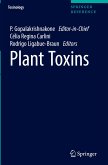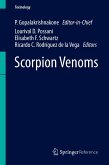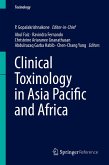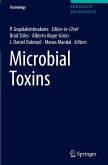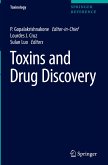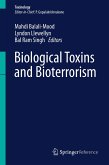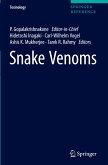Plant Toxins, m. 1 Buch, m. 1 E-Book
Mit E-Book
Herausgegeben:Gopalakrishnakone, P.; Carlini, Célia Regina; Ligabue-Braun, Rodrigo
288,99 €
inkl. MwSt.
Versandkostenfrei*
Liefertermin unbestimmt
Melden Sie sich
hier
hier
für den Produktalarm an, um über die Verfügbarkeit des Produkts informiert zu werden.

144 °P sammeln
Plant Toxins, m. 1 Buch, m. 1 E-Book
Mit E-Book
Herausgegeben:Gopalakrishnakone, P.; Carlini, Célia Regina; Ligabue-Braun, Rodrigo
- Audio CD mit DVD
This volume, in its over two dozen chapters, constitutes an overview of the current plant toxin research. It covers from general aspects of plant toxicity to in-depth reviews of various classes of toxins, their structures, synthesis, modes of action, and upcoming uses in biotechnology. It provides an encompassing landscape of plant toxinology for both toxinologists and non-toxinologists alike.
Andere Kunden interessierten sich auch für
![Plant Toxins Plant Toxins]() Plant Toxins193,99 €
Plant Toxins193,99 €![Scorpion Venoms Scorpion Venoms]() Scorpion Venoms217,99 €
Scorpion Venoms217,99 €![Clinical Toxinology in Asia Pacific and Africa Clinical Toxinology in Asia Pacific and Africa]() Clinical Toxinology in Asia Pacific and Africa203,99 €
Clinical Toxinology in Asia Pacific and Africa203,99 €![Microbial Toxins Microbial Toxins]() Microbial Toxins199,99 €
Microbial Toxins199,99 €![Toxins and Drug Discovery Toxins and Drug Discovery]() Toxins and Drug Discovery216,99 €
Toxins and Drug Discovery216,99 €![Biological Toxins and Bioterrorism Biological Toxins and Bioterrorism]() Biological Toxins and Bioterrorism210,99 €
Biological Toxins and Bioterrorism210,99 €![Snake Venoms Snake Venoms]() Snake Venoms216,99 €
Snake Venoms216,99 €-
-
-
This volume, in its over two dozen chapters, constitutes an overview of the current plant toxin research. It covers from general aspects of plant toxicity to in-depth reviews of various classes of toxins, their structures, synthesis, modes of action, and upcoming uses in biotechnology. It provides an encompassing landscape of plant toxinology for both toxinologists and non-toxinologists alike.
Produktdetails
- Produktdetails
- Toxinology
- Verlag: Springer / Springer Netherlands
- Artikelnr. des Verlages: 978-94-007-6465-1
- 1st ed. 2017
- Seitenzahl: 473
- Erscheinungstermin: April 2017
- Englisch
- Abmessung: 235mm x 155mm
- ISBN-13: 9789400764651
- ISBN-10: 9400764650
- Artikelnr.: 37159403
- Herstellerkennzeichnung Die Herstellerinformationen sind derzeit nicht verfügbar.
- Toxinology
- Verlag: Springer / Springer Netherlands
- Artikelnr. des Verlages: 978-94-007-6465-1
- 1st ed. 2017
- Seitenzahl: 473
- Erscheinungstermin: April 2017
- Englisch
- Abmessung: 235mm x 155mm
- ISBN-13: 9789400764651
- ISBN-10: 9400764650
- Artikelnr.: 37159403
- Herstellerkennzeichnung Die Herstellerinformationen sind derzeit nicht verfügbar.
Prof P. Gopalakrishnakone is a world leader in the characterization of the structure and function of animal and plant toxins and chemical poisons, which contain highly specific and biologically active components. He has contributed significantly to the body of knowledge regarding the anatomy of snake venom glands and the development of drug candidates from animal toxins.
Prof Gopal pioneered the development of the NUS Venom and Toxin Research Programme, which has put NUS at the forefront of toxin research internationally. The technology platform that has been built over the years under the Venom and Toxin Research Programme, coupled with its extensive library of protein and peptides, has enabled Prof Gopal and his team to complete the discovery process of lead candidates in time and to transfer valuable supplementary information to the next discovery steps involving profiling and optimization of lead candidates. The objective is to characterize the venom components and natural toxins at a molecular level and identify promising compounds amenable to the development of novel human therapeutics. Prof Gopal's lab has identified over twenty peptides with unique medical indications from venom-based proteins with some already under development as therapeutics.
Prof Gopal's research studies includes structure function studies (toxin detection, biosensors, antitoxins and neutralization factors), toxicogenomics and expression studies, antimicrobial peptides from venoms and toxins and PLA2 inhibitors as potential drug candidate for inflammatory diseases. The techniques he employs include quantum dots to toxinology, computational biology, microarrays and protein chips. He has patented analgesic peptide, anti inflammatory peptide as well as anti rheumatoid arthritis peptides. He is exploring various possibilities of delivery systems for these peptides to target sites and administration of these peptides orally, transdermally, ocular and injections.
Prof Gopal has over 100 international peer-reviewed papers in venom and toxin research, drug discovery, biosensors, and toxinogenomics. His research awards include the Outstanding University Researcher Award from the National University of Singapore (1998); Ministerial Citation, NSTB Year 2000 Award in Singapore; and the Research Excellence Award from the Faculty of Medicine, National University of Singapore (2003). His awards in teaching include, Faculty Teaching Excellence Award 2003/4 & NUS Annual Teaching Excellence Award 2003/4. He also received the Faculty Teaching Excellence Award in 2009/10 and the Annual Teaching Excellence Award, NUS FOR 2009/10. He is the President of International Society on Toxinology till 2012, and is a member of the editorial board of Toxicon, the official journal of the International Society on Toxinology.
Prof Gopal pioneered the development of the NUS Venom and Toxin Research Programme, which has put NUS at the forefront of toxin research internationally. The technology platform that has been built over the years under the Venom and Toxin Research Programme, coupled with its extensive library of protein and peptides, has enabled Prof Gopal and his team to complete the discovery process of lead candidates in time and to transfer valuable supplementary information to the next discovery steps involving profiling and optimization of lead candidates. The objective is to characterize the venom components and natural toxins at a molecular level and identify promising compounds amenable to the development of novel human therapeutics. Prof Gopal's lab has identified over twenty peptides with unique medical indications from venom-based proteins with some already under development as therapeutics.
Prof Gopal's research studies includes structure function studies (toxin detection, biosensors, antitoxins and neutralization factors), toxicogenomics and expression studies, antimicrobial peptides from venoms and toxins and PLA2 inhibitors as potential drug candidate for inflammatory diseases. The techniques he employs include quantum dots to toxinology, computational biology, microarrays and protein chips. He has patented analgesic peptide, anti inflammatory peptide as well as anti rheumatoid arthritis peptides. He is exploring various possibilities of delivery systems for these peptides to target sites and administration of these peptides orally, transdermally, ocular and injections.
Prof Gopal has over 100 international peer-reviewed papers in venom and toxin research, drug discovery, biosensors, and toxinogenomics. His research awards include the Outstanding University Researcher Award from the National University of Singapore (1998); Ministerial Citation, NSTB Year 2000 Award in Singapore; and the Research Excellence Award from the Faculty of Medicine, National University of Singapore (2003). His awards in teaching include, Faculty Teaching Excellence Award 2003/4 & NUS Annual Teaching Excellence Award 2003/4. He also received the Faculty Teaching Excellence Award in 2009/10 and the Annual Teaching Excellence Award, NUS FOR 2009/10. He is the President of International Society on Toxinology till 2012, and is a member of the editorial board of Toxicon, the official journal of the International Society on Toxinology.
Biotechnological Potential of Ribosome Inactivating Proteins (RIPs).- Cyanotoxins Cyclotides: Plant Defense Toxins.- Entomotoxic Plant Proteins: Molecules to Develop Genetically Modified Plants Potentially Resistant to Insect-Pests.- General Mechanisms of Plant Defense.- Locoweeds and Swainsonine.- Moonlighting Toxins: Ureases and Beyond.- Oleander Poisoning.- Phycotoxins Other Than Cyanotoxins.- Plant AB Toxins with Lectin Domains.- Plant Alkaloids: Main Features, Toxicity, and Mechanisms of Action.- Plant and Fungal Hallucinogens as Toxic and Therapeutic Agents.- Plant Compounds with Antiophidic Activities, Their Discovery History, and Current and Proposed Applications.- Plant Cyanogenic Glycosides.- Plant Toxins as Sources of Drugs.- Plants Toxic to Farm and Companion Animals.- Proteinaceous Plant Toxins with Antimicrobial and Antitumor Activities Ribosome-Inactivating Proteins: An Overview.- Suicidal Plant Poisoning.- The Role of Metal-Based Defenses in Plants.- Toxic but Exploitable Actions of Ribosome-Inactivating Proteins.- Toxic Chemicals from Invasive Alien Plants.- Toxic Nonprotein Amino Acids.
Biotechnological Potential of Ribosome Inactivating Proteins (RIPs).- Cyanotoxins Cyclotides: Plant Defense Toxins.- Entomotoxic Plant Proteins: Molecules to Develop Genetically Modified Plants Potentially Resistant to Insect-Pests.- General Mechanisms of Plant Defense.- Locoweeds and Swainsonine.- Moonlighting Toxins: Ureases and Beyond.- Oleander Poisoning.- Phycotoxins Other Than Cyanotoxins.- Plant AB Toxins with Lectin Domains.- Plant Alkaloids: Main Features, Toxicity, and Mechanisms of Action.- Plant and Fungal Hallucinogens as Toxic and Therapeutic Agents.- Plant Compounds with Antiophidic Activities, Their Discovery History, and Current and Proposed Applications.- Plant Cyanogenic Glycosides.- Plant Toxins as Sources of Drugs.- Plants Toxic to Farm and Companion Animals.- Proteinaceous Plant Toxins with Antimicrobial and Antitumor Activities Ribosome-Inactivating Proteins: An Overview.- Suicidal Plant Poisoning.- The Role of Metal-Based Defenses in Plants.- Toxic but Exploitable Actions of Ribosome-Inactivating Proteins.- Toxic Chemicals from Invasive Alien Plants.- Toxic Nonprotein Amino Acids.

